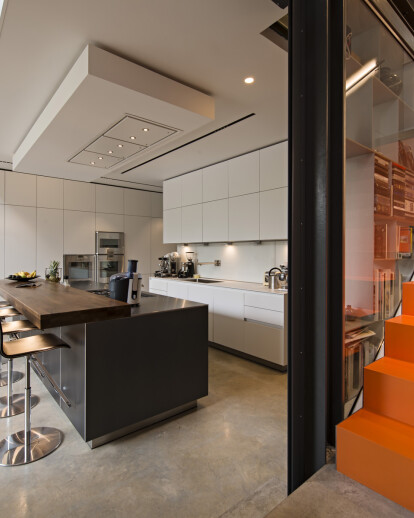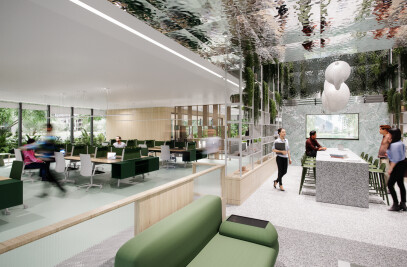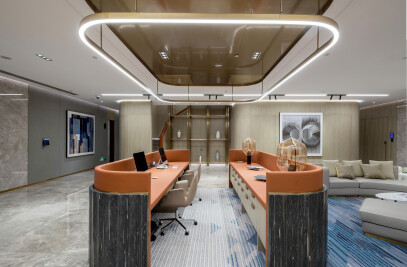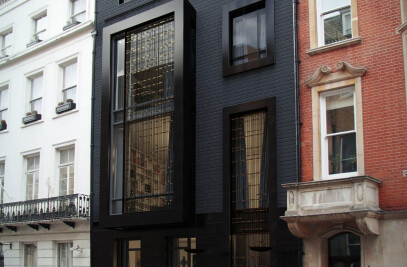SHH has created a complete transformation of the ‘House of Books’ in Hampstead. The property’s name derives from its previous owner, Labour leader Michael Foot, who was known as ‘The Old Bibliophile’ because ofhis enormous library of books, as well as his own personal erudition and authorship. Foot’s house was, in the words of journalist Anthony Howard, ‘dedicated to books – reaching high to the ceiling in bookshelves, piled untidily on tables, even scattered randomly about on the floor.’
On purchasing the property after Foot’s death, the new owners commissioned SHH to gut and remodel the house entirely, but in a way that was very much in keeping with the spirit of the previous owner. The new scheme is formed therefore around a stunning library structure that runs through all five floors of the property - as the new owners also happened to be complete bibliophiles, with over 100 linear metres of books of their own.
SHH Associate Director, Stuart McLauchlan, who led the project, said that both the bookcase and the newstair which wraps around it were absolutely central to the new design for the house, forming a top-to-bottom spine,off which all other spaces were then arranged.The property was completely guttedand then re-created behind its traditional frontage to achieve this radical new interior structure, together with a new cedar and zinc side and rear extension to increase floor space. Whilst the house was not listed, it is situated in a conservation area and the retention of the existing façade was a requirement of planning permission terms.
‘We ripped the whole house out behind the façade’ explained Stuart McLauchlan, ‘and built a new steel and timber-frame to sit within the old brick skin and connect it to the existing structure. The space configuration and resulting floors, walls and stair are all new, with the new stair more linear than its predecessor and set to one side in order to create more floorspace. The house was extended not only to the rear but also to the side in order to house the ambitious new stair and bookcase concept.’
The five-storey house starts with a garden level and goes up to a raised ground floor entrance level, which doesn’t extend fully to the far edge of the rear extension, so that a double-height space is created beyond at the back of the house. A master suite is located on the first floor, with further bedrooms and bathrooms for the client’s family on the second and third floors.
The new aluminium, double-sided bookcase is inset into the house’s new timber- and steel-frame and is held in place by the house’s exposed structure, although in itself it is not a structural element – bar the high-tension cables that go through the bookcases, which form part of the safety railing for the staircase balustrades.
The striking bright orange stair, which wraps round the bookcase on all five levels, is made of individual steel trays dipped in orange liquid rubber and bolted over individual cantilevered steel hoops. A curved steel hoop was bolted into each upside-down U-shaped tray in raw, blackened steel, with the top surface then dipped in vibrant, orange liquid rubber. The trays are open-ended so that the end of the hoop is visible from the far side. The stair floats 50mm away from the bookcase with open risers. On the very first level (garden level up to ground floor), the stair has the same colour and finish but doesn’t have an open structure, but rather a solid plywood structure instead, so that services (AV hub, switch gears, lighting controls) and a coat store can be housed beneath it and out of sight.
The stair runs up alongside the bookcase on each floor, so that every book is accessible to the new owners and their family.The bookcase is made up of machined anodised aluminium sheets, which were precision-engineered and machine-screwed together so that there are no welds, with counter-sunk stainless steel screws so that every junction is perfect.
‘The bookcase, staircase and balustrades were manufactured to meet our designs by Square Circle Design’Stuart McLauchlan commented ‘who did a brilliant job in answering such a complex and exacting specification.’
The bookcase also features glazed, walk-on slots set into the timber floor directly in front of the bookcase at every level, allowing full top-to-bottom views, whichever level you are on. The bookcase finishes 1.1m above floor level on the top storey with a skylight directly above, which opens according to an automated temperature sensor and closes when it rains.
The brief for the interior, beyond the bookcase and stair structure, was to create a sense of surprise from the moment the front door opens, giving visitors immediate views on entry right through the house and through the rear extension to the garden beyond, rather than into the classic entrance hall and stair of a house of this period. ‘To achieve this, we had to create a very technically-complex arrangement of the systems for the smoke and fire curtain systems’ explainedStuart McLauchlan.
A quiet and relaxing ante-lobby and working space is located on the entrance floor, together with a separate office space for one of the owners, who works from home. This area has doors that can be folded away, so that the entrance level area can be completely open plan when not in use, bar the toilet area. Sofas at the far end of this space give users views right through the two-storey space beyond and the glass sliding doors of the rear of the extension, with the ceiling of the extension created one metre higher than the entrance floor level in order to create this sightline.
The two-storey extension to the side and rear is made up of two main components: dark zinc and solid cedar, with the cedar wrapping around the corner edge. A series of angled louvres maintains views out but prevents immediate neighbours from seeing in. The extension features a sliding, glazed curtain wall system with slim (22mm wide) framing elements in black aluminium. A glass gasket runs over the top to allow the new to complement the old, with the glass integrated into the structure, but acting as a separation.
‘The planning permission stage of the project was quite challenging’Stuart McLauchlancommented.‘Whilst Camden Borough Council liked the project, neighbours were initially concerned about light pollution from the extensive use of glass in the new scheme. Our solution was to coat the glass with tinted film, which allowed the light in but minimised its outward effects.’
The garden level formed by the new extension is the heart of the new home, with the interior made-up of a large, open-plan kitchen (from Bulthaup); a high-bar dining area; a more formal dining area and a seating nook, surrounded by a timber frame. The floor is in polished concrete, which was hand-polished for a really high-quality finish, whilst the dining table was bespoke-designed bySHH’sStuart McLauchlan.At the back of the space is a TV snug area and toilet.
The first floor features the clients’ master suite and dressing rooms, with full-height walnut walls in the dressing room. The whole suite features fold-back double doors so that it can be completely open during the day and sealed off only at night. The bathroom is all in white with a single black mosaic wall.
Family bedrooms and a shared shower room are on the first floor, with a family bedroom plus shower and toilet, and guest bedroom with a shower and toilet area set into a loft space with a steep, pitched roof on the second floor.


































